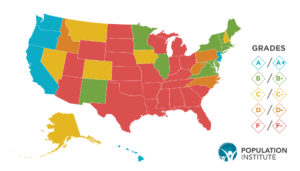Today the non-profit Population Institute released its ninth annual 50 State Report Card on Reproductive Health and Rights. The most comprehensive assessment of its kind, the report card tracks multiple indicators of reproductive health and rights, including sex education and access to family planning and abortion services across each state. The latest report card finds that there is still a large divide between states that are prioritizing reproductive rights and access to reproductive health services versus those that are seeking to curtail them. Five states got an “A” in this year’s report card, 23 states failed, and for the second year in a row, the U.S. as a whole also failed.
The Biden-Harris administration will strive to improve reproductive health and rights at the federal level, but the reshaping of the federal judiciary by the Trump-Pence administration could undermine Americans’ reproductive health, rights and justice for decades to come. “Because of the conservative shift of the courts,” said Jennie Wetter, the Population Institute’s director of public policy, “the Biden-Harris administration faces a steep uphill battle in its fight to protect reproductive health and rights. With the future of Roe at stake we have reached a critical turning point for reproductive health and rights. The federal courts will become a perpetual battleground.”
Over the past year anti-choice advocates were relentless in their efforts to restrict access to reproductive health care. In several states they used the pandemic as a pretext for denying access to abortion services by classifying it as non-essential health care. Last month, in the waning days of the Trump administration, the U.S. Supreme Court, which now includes three Trump-appointed justices, granted a Trump administration request made last year requiring people seeking a medication abortion to see a doctor in person. This forces patients to make an unnecessary trip to a hospital or a physician’s office in the midst of a pandemic putting their health needlessly at risk.
While the courts have blocked many attacks in recent years, Wetter said, “Anti- choice advocates will keep trying to restrict access to reproductive health services. The Biden-Harris administration has a lot of work to do. Not everything will be easily or quickly fixed. One thing that the Biden administration could immediately address is medication abortion. They could waive the in-person requirement for medication abortion during the pandemic and ask the FDA follow scientific evidence and remove the requirement permanently.”
Taking advantage of the new make-up of the Supreme Court, anti-choice advocates are expected to unleash a flurry of legal challenges to any new legislative or regulatory changes. “If they succeed,” Wetter warned “the people most impacted will be underserved populations, including low income people, Black people, other communities of color, young people, and the LGBTQ+ community. That means the existing disparities in access to reproductive health services will worsen. Despite the new Congress and the new administration, the fight over affordable access to sexual and reproductive health care is far from over.”
Methodology — Using thirteen separate criteria, the Institute’s report card ranks each of the 50 states and the District of Columbia according to four broad indicators relating to reproductive health and rights: effectiveness, prevention, affordability, and access. Based upon their composite scores (0-100), each state receives a “core” grade (A, B, C, D or F), but some states received an additional “plus” or a “minus” for factors not reflected in the core grade.
State Grades – Five states (California, Hawaii, New Jersey, Oregon, and Washington) received an “A” in this year’s report. Twenty-three states received a failing grade: Alabama, Arizona, Arkansas, Florida, Georgia, Indiana, Kansas, Kentucky, Louisiana, Michigan, Mississippi, Missouri, Nebraska, North Dakota, Ohio, Oklahoma, South Carolina, South Dakota, Tennessee, Texas, Utah, Wisconsin, and Wyoming.
The National Grade – For the second year in a row, the U.S., as a whole, received an “F.” Several factors account for the failing grade, notably:
- Title X – The Trump-Pence administration’s imposition of a “domestic gag rule,” which bars Title X clinics from counseling patients about abortion or referring them to abortion services. This had a devastating impact on the Title X grant program, which provides family planning services to 4 million households a year. Several states and providers, including Planned Parenthood, opted out rather than abide by the new restrictions. As traditional and trusted family providers dropped out, the Trump administration replaced them by awarding Title X grants to “crisis pregnancy centers” run by staunch anti-abortion advocates, some of whom do not even provide contraceptive services to clients.
- Federal Courts – After the death of Justice Ruth Bader Ginsburg, President Trump appointed his third justice to the U.S. Supreme Court. With Amy Coney Barrett joining fellow Trump appointees Brett Kavanaugh and Neil Gorsuch on the bench, there is now a solid 6-3 conservative majority. Meanwhile, the U.S. Senate also confirmed over 200 Trump-nominated judges to lower federal courts. In addition to restricting abortion rights, a more conservative federal judiciary could render rulings adversely affecting Title X, the coverage of contraception under the Affordable Care Act, and LGBTQ protections.
- Sex Education – The Trump-Pence administration sought to slash federal support for evidence-based, comprehensive sexuality education. Instead, the administration is promoted “sexual risk avoidance” programs that embrace the failed “abstinence-only” approach backed by conservatives. Such programs are shown to have negative reproductive health outcomes.


